Daniel Perez Takes Tenacity to Transport
/in Economic Opportunity, Featured, JobMakers /by Editorial StaffThis week on JobMakers, host Denzil Mohammed talks with Daniel Perez, immigrant from Colombia and founder, president and CEO of DPV Transportation Worldwide, based in Everett, Massachusetts. Daniel shares what it meant to tap into his entrepreneurial spirit and become a success, pivoting into healthcare and community service when the transportation sector was impacted by the pandemic, and finding a way to use his fleet for good. He discusses his work to help communities like the one where he grew up, East Boston, long a gateway for immigrants. Not only is Daniel’s firm minority-owned, its staff of 200 is 80-percent minority, and he is focused on building opportunities for youth of color, including in entrepreneurship, as you’ll learn in this week’s JobMakers.
Guest:
 Daniel Perez is a young entrepreneur who founded DPV Transportation. In 2006, Daniel started out driving athletic teams to win games across state lines. Now, his company drives the success of corporations across the country and executives around the world. Perez trained himself to pivot for success. He became an innovator, to be there for communities in need, as well as his own family. Daniel is a man of many trades, he is a CEO, podcaster, entrepreneur, father of two young boys and loves going on epic adventures.
Daniel Perez is a young entrepreneur who founded DPV Transportation. In 2006, Daniel started out driving athletic teams to win games across state lines. Now, his company drives the success of corporations across the country and executives around the world. Perez trained himself to pivot for success. He became an innovator, to be there for communities in need, as well as his own family. Daniel is a man of many trades, he is a CEO, podcaster, entrepreneur, father of two young boys and loves going on epic adventures.
Get new episodes of JobMakers in your inbox!
Read a Transcript of This Episode
Please excuse typos.
Denzil Mohammed:
I’m Denzil Mohammed. Welcome to Jobmakers
Denzil Mohammed:
Of all the sector’s hardest hit by the pandemic. Transportation was one of the worst McKinsey and company predicted. It would take more than five years for muted recovery in the transportation sector. So how could a transportation business survive two years when people didn’t really have anywhere to go for Daniel Perez, immigrant from Columbia and founder and president and CEO of DPV transportation worldwide in Everett, Massachusetts. It meant tapping into that entrepreneurial spirit that made him a success in the first place. He pivoted to healthcare and community service and found a way to use his fleet for good and for survival Daniel’s agility and acumen served him well, but the place where he wants to have the most impact is in the communities like the one he grew up in east Boston, along a gateway for immigrants, not only is his firm minority owned it’s staff of 280% minority, and Daniel is focused on building opportunities for youth of color, including an entrepreneurship. As you learn in this week’s job makers, Daniel Perez, president and CEO of DPV transportation, worldwide immigrant from Columbia. Welcome to the Jobmakers podcast. How are you?
Daniel Perez:
Great, thank you for having me here, Denzil.
Denzil Mohammed:
So tell us a little bit about your business and why it’s special.
Daniel Perez:
Sure. So DPV transportation is a worldwide show for services specializing in providing ground transportation services for corporations and institutions that that are looking for a consistent and reliable service to go to the airport for client meetings and special events. We have two main divisions, one, which is our chauffeur services. Again, we it’s mainly a black car services where we service this corporation and, and sea level executives with a white glove service experience to go to the airport for meetings and other private events. And then we have our shuttle bus division, which pretty much is our, is our largest component of our business that focuses on fortune 1000 companies as well. And we transport their employees from their headquarters to train stations, train station, to headquarters, or within the, the main headquarters as well.
Denzil Mohammed:
And how did you get into this? I don’t think you had it in mind that you were gonna start a, a car business when you were growing up.
Daniel Perez:
Yeah. I always tell all my folks and friends and family and mentees that I started with a pure ignorance, not knowing what I was gonna get into. If I was to redo it all over again, I probably will not do it <laugh> but how I started is it was I was a wild teenager growing up and my dad highly recommend me to get a job where he was working and it was another transportation company, but they mistreated their employees. Their customer experience was horrible. And for some reason, I, I said to myself, Hey, let me create something better, something unique with a better experience to the customer and make the most out of it. And I started from my parents’ kitchen. I turned the, the, the phone, the, you know, like the, the home phone, I turned into an office. So when everyone used to call, I used to tell everybody to, to keep it down, cuz most likely it was a client. And I turned the kitchen into a whole office. It started, you know, working day and night from, from my parents’ kitchen. And from there, I was able to scale up the business working very hard at that point now working smart and I moved, I transitioned into a small office where I work day and night.
Denzil Mohammed:
Well, speaking of that, this white glove service that you talk about how were you able to position yourself in the market and how did you grow over the years?
Daniel Perez:
That is a great question. Thank you for asking. So what as a, what I was able to do is move from a younger entrepreneur of working hard, 24 7 to a more mature entrepreneur working smarter and hard, but more on the, with a, with a smart perspective. So smart was put in more systems and procedures in place being more strategic instead of tactical and really narrowing down who is, who was the ideal persona or client persona that will get us to where we wanna go, cuz when you’re lost, any bus will take you there. Right? So I decided to really narrow down the, the scope of where we wanted the business to be in in three years and five years. And we just laser focused and massive action.
Denzil Mohammed:
I recall you saying once that you, you got this business savvy from your father, is that correct?
Daniel Perez:
He gave me a really good nuggets at the beginning. I love my dad. I love my mom. My dad is, is he grew up with a different business methodology of, about working really hard. So I, you know, he, he, which served me very well, but nowadays the, the skills that he taught me you know, where we managing now about 220 employees as in served me as much as he used to serve me back then. But definitely I got his entrepreneurship, his spirit and dedication and tenacity to, you know, to not give up and, and pursue the dreams, you know? So I definitely got his, his nuggets out of that.
Denzil Mohammed:
And speaking of your dad, you grew up in Columbia what was life like back in Columbia when you were growing up? A lot of Americans don’t don’t know what life was like in south America.
Daniel Perez:
Sure. Appreciate you asking the question. So I, I grew, I was in Columbia. I was born in Columbia until I was 11 years old originally from managing Columbia. And then I moved from Meine to Boston, where we moved pursuing the American dream from Boston to New York, New York to North Carolina, North Carolina, to New Hampshire, and then New Hampshire back to Boston. So growing, you know, back to, to your original question, growing up in Columbia was fun because I didn’t have to worry a bunch about producing income and worrying about bills. And we were, you know, we, we were middle, middle high class family with all the amenities to live a, a good bringing as a, as a teenage boy. So it was, it was fun. But then when we came to the us, like everything changed, it was, we went from being a middle class to more of a, you know sort of a poor family where we were living on a 10 by 10 room. And there was like six of us or seven of us and the first year or two, which is horrible, you know, the change of weather not speaking the language, different cultures. But it was kind of who, who, it’s kind of what made me say it as an individual, you know, all those adversities that I could bring it into the business ecosystem and just embrace adversity cuz you know, if you are, once you start learn learning to get comfortable and the uncomfortable that’s when we grow the most
Denzil Mohammed:
Learning from adversity, I love that. So you said that first couple of years were hard and a lot of Americans don’t realize that when immigrants move here, they often take a step down in their careers, in their income their standard of living. So guide us through the, the way you grew your business. You went from, you know, home kitchen landline into something that is huge now. I mean, I, when I met you in 2017, you had 49 employees and now you have over 200, that’s pretty incredible. How did you grow the business?
Daniel Perez:
I, I would say, you know, there’s not, there’s not a secret formula. There’s not a secret recipe. I just wrote on, on a lot of waves of other people, other people’s waves of as far as wisdom and advice, I’m sort of a sponge. I, I analyze, I, I listen, I observe what other successful people in my industry and other industries are doing. And I’m always willing to see what is it that I’m not seeing and what is it that I could learn. And lately throughout the years that my brother was a huge asset to the business. He recently a year ago he pursued his own dream of opening a boutique business consultant which he also has a PhD in humanities. So he, he went on his own and we were fortunate to find a COO, which is pretty much my right hand at this point as well. Leading the organization forward.
Denzil Mohammed:
Now you pride yourself on being a minority owned business and according to your website, 80% minority employees, why is that important to you and why should that be important overall?
Daniel Perez:
And that is a great question. Thank you for asking. So overall I’m, I’m a, I am a minority, so I’m proud of creating more minority impact in our communities. And I guess the, the key element is to be mindful of the ritual effect that minority-owned communities have on our communities, right? The more success success that we get within our communities, the more that it will benefit our children, the, the younger generations where they’re able to get jobs at this sort of communities and benefit overall from, from the success cause otherwise the, the world cap continues to be massive, right? So we contribute in one way or another to try to minimize the gap, not only financially, but to support to the communities, right? Whether your black, Latino, you’re black, Latino, Asian, whatever it might be, where we could actually contribute in, in any aspect that we could to, to our communities.
Denzil Mohammed:
So it’s all about community impact, uplifting your communities, sort of putting money back into the communities righting,
Daniel Perez:
Correct? Yes. And, and again, nowadays, I, I get a, I love business. I love making money, but there’s the way that I define being rich is where I’m well rounded, where I am striving in my family and my relationships and my spirituality, but most importantly, contributing to society, especially to other com you know, other minority populations too, just like myself.
Denzil Mohammed:
Now I wanna bring it into the present need. Let’s just say your business was heavily impacted by the pandemic. I think you, you said that 95% of your business vanished how, how did you ride that wave
Daniel Perez:
<Laugh> oh, that’s a really good question. So Mike Tyson said of best everyone has a plan until you get punched in the face. Right. And we got punched in the face and, and we didn’t get knocked down. We got knocked down, but we stood up and it was two years of working day and night with a lot of tenacity two years ago, when I was in the trenches in, in the storm, it was all about mindset, dedication, commitment, and just trust, trusting that this was happening for us. And once, once I, I accepted that we were either going to file for bankruptcy, or we were going to strive. I said, operating from a piece of mind and knowing that I given my, my oath, my, my a hundred percent.
Denzil Mohammed:
So you mentioned that quote from Mike Tyson, I guess I’m trying to think of some of the things you learned as a result of the pandemic that may prepare you in the future for when next you get punched in the face.
Daniel Perez:
One of them is, you know, we, obviously we become who we hang around with most of the time and, and the five people who, who we hang around with or surround ourselves with. And that’s, that helped me a lot, just positioning myself in the right environments with other savvy and experience entrepreneurs that have gone through other economy, recessions that provide me with a ton of support emotionally and, and intellectual and intellectually to, to get me out of those situations. So that was one of them to always keep surrounding myself with the right people, to also as a leader, to have the right mindset, because especially as an entrepreneur and as a leader, there’s so many emotions that we have to manage is where we, when we managing either a small or a larger organization, there’s too many components and a lot of human errors and emotions to deal with. But the more, the one that you have to for me personally, is, is to control my own emotions and my own state of mind. So a way when these adversities comes, you could actually embrace them, learn from them and keep moving forward, not idling or this on the size of where to go. Right.
Denzil Mohammed:
You mentioned spirituality a little bit, but a little while ago, I cannot imagine how much pressure was on you in twenty, twenty two hundred and fifty employees under you, you know, getting furloughed all this pressure. So yeah, I’m sure that’s, your spirituality is gonna help you out a lot in this role. You’re not just doing transportation though. You are in tech. So tell us a little bit about DPV mobile lab. What are you currently doing and what do you plan to do in the future?
Daniel Perez:
Yes, so pretty much when we, when, when the pandemic hit, we had about a hundred buses sitting in the parking lot and between my brother and I, we just started brainstorming, what do we do with all this equipment? And what we were able to do is pivot into the medical sector. So what we were able to do is transition our buses into mobile clinics. So about 50% of our buses, we transformed them into mobile clinics. And we were at the beginning, we started doing mobile sort of help support where we were delivering mask and you know, and anything to support with the pandemic, right. And we partner with several hospitals in, in the area to, to support them as well. And then we pen, we transition to deliver the vaccine. So we open several mobile vaccine clinics in New York, in Massachusetts, where residents will comment to the bus and we will get them vaccinated. And this was again through, through partnerships with several hospitals in, in Massachusetts, Connecticut and New York.
Denzil Mohammed:
And you also have apps that go along with your ride services, right?
Daniel Perez:
Correct. Yes. So we have apps that will show the riders exactly where the bus are located. How far is it how many riders in the bus are, are they hitting any traffic? For the most part, we, we deal with large organizations where we’re managing their, the transportation program. So that’s what allows the transparency from the rider to the, to the provider to see exactly how their transportation program is being run.
Denzil Mohammed:
How, what, how has that experience been going into the so sort of tech aspect of what you’re doing?
Daniel Perez:
It’s one of our key differentiators. It allows us to, to be more agile and, and to keep innovating in our, in, in our industry, we’re always looking for ways to innovate. That’s that was one of them. And now we’re looking to keep expanding into different markets. We recently started we go into more into the health sector, as well as other training sectors as well, where we training the workforce of how to obtain their CDO license. We’re doing that in a couple states, and then we’ll also transition into mobile health. How do we get into minority communities to support them with, with mobile health initiatives?
Denzil Mohammed:
Wow, that’s great. And you are, I mean, even pre pandemic healthcare transportation with two of the fastest growing industries. So you are very well positioned to embrace the future. Finally. you had your father to look up to as an entrepreneur growing up but not everyone has that privilege of having a mentor. What advice would you give young, but entrepreneurs of color?
Daniel Perez:
Yes. Well, thank you for asking the question, cuz honestly, this is a question that we gotta keep asking within our communities, not only to, to ask, which I’m a huge believer that the, the better, the questions, the better the answers. And this is one of the key questions that our, our younger crowd needs to really keep asking themselves because it’s such a great time to strive being a, being a minority, being a individual of color, to go out there and, and pursue your dreams when there’s so much support for minority-owned companies. And sometimes we use, you know, sometimes we believe and we create beliefs that this is a disadvantage when it’s actually an advantage for, for us to be companies of being a minority owned companies, especially if you’re able to partner with corporations that are looking to partner with minority own companies. And that’s one, one of, one of the big elements that we use. There’s a ton of corporation support minority young companies, and it will be dumb not to pursue those opportunities. And, and this is the, one of the errors when it has been the easiest to grow, especially as a minority young company,
Denzil Mohammed:
Capturing those opportunities, right. And just being aware of what opportunities are out there. And I imagine a lot of young people growing up, don’t, aren’t aware that there is support now, probably not 22 years ago, but certainly now I imagine there’s a lot more support now than when you started the business in 2006 Daniel Perez founder, CEO of DPV transportation worldwide. Thank you for joining us on the job makers podcast.
Daniel Perez:
Thank you for inviting me. Appreciate it.
Denzil Mohammed:
Jobmakers is a weekly podcast about immigrant entrepreneurship and contribution produced by Pioneer Institute, a think tank in Boston and the Immigrant Learning Center in Malden, Massachusetts, a not-for-profit that gives immigrants a voice. Thank you for joining us for this week’s powerful story of immigrant entrepreneurship and ingenuity. Remember, you can subscribe to job makers on apple podcasts, Spotify, or wherever you get your podcasts. And please leave us a rating and a review. I’m Denzil Mohammed. See you next Thursday at noon for another Jobmakers.
Recent Episodes:
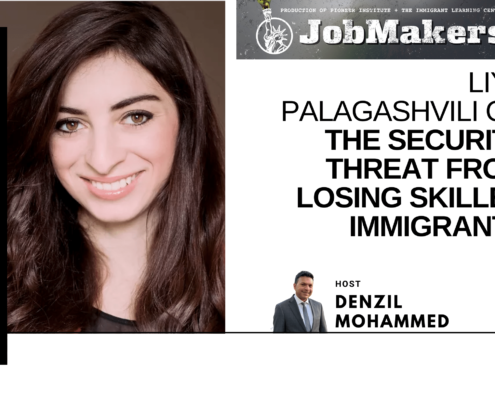
Liya Palagashvili on the Security Threat from Losing Skilled Immigrants
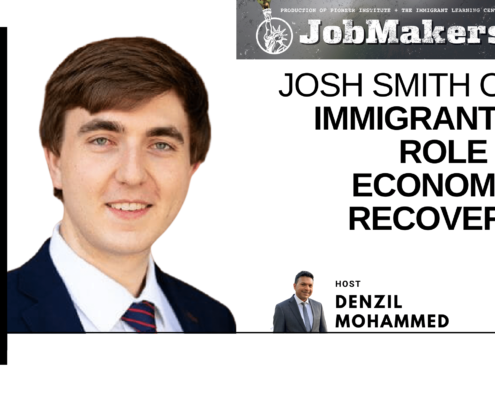
Josh Smith on Immigrants’ Role in Economic Recovery
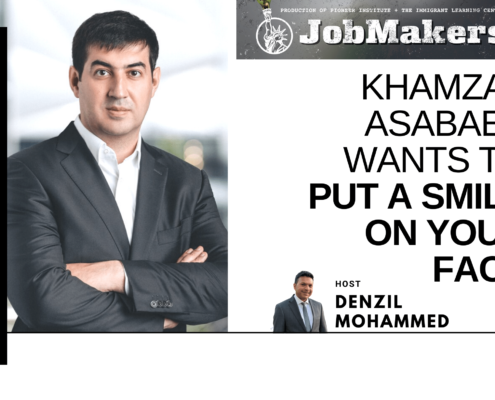
Khamzat Asabaev Wants to Put a Smile on Your Face
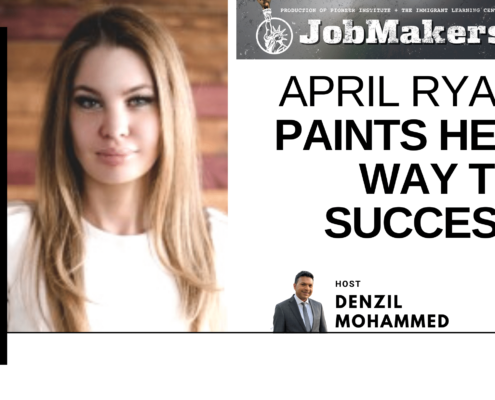
April Ryan Paints Her Way to Success
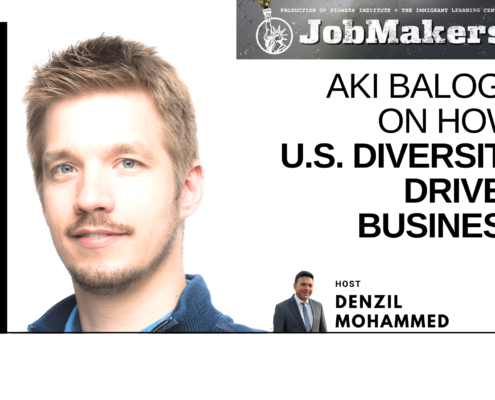
Aki Balogh on How U.S. Diversity Drives Business
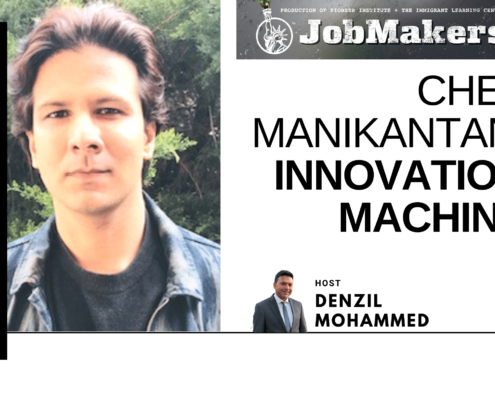
Chet Manikantan: Innovation Machine
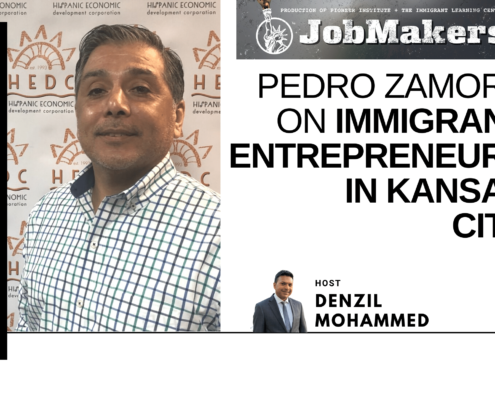
Pedro Zamora on Immigrant Entrepreneurs in Kansas City
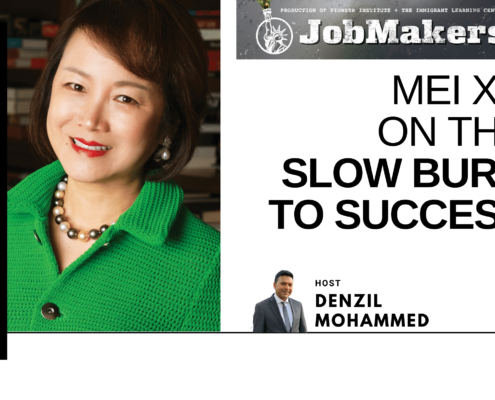

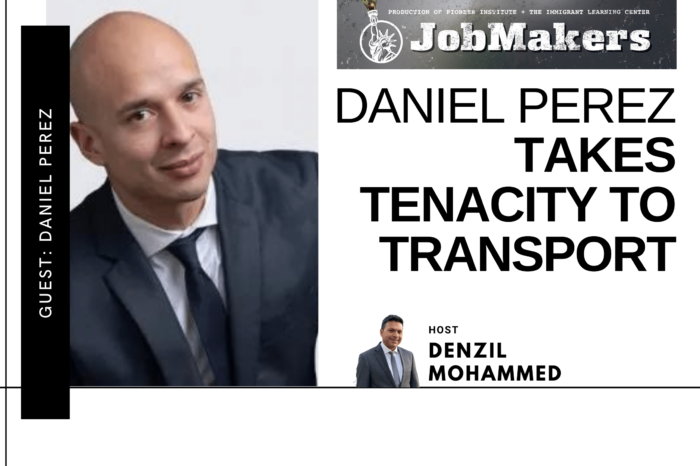

 This file is licensed under the Creative Commons Attribution 2.0 Generic license.
This file is licensed under the Creative Commons Attribution 2.0 Generic license.